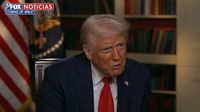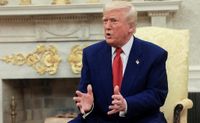In a recent interview with Fox News, U.S. President Donald Trump expressed his concerns about the influence of drug cartels in Mexico, stating that the country is "very, very afraid of the cartels in reality." Trump elaborated that these criminal organizations control large portions of Mexico, a situation he described as troubling but one he is hesitant to emphasize due to his positive relationship with Mexican President Claudia Sheinbaum.
During the interview, host Rachel Campos-Duffy highlighted that "40% of the territory in Mexico is controlled by the cartels, at least." In response, Trump acknowledged the severity of the issue, saying, "the relationship is very good and we want to help her, help Mexico, because you can't govern a country like that." This statement reflects Trump's ongoing commitment to working collaboratively with Mexico to combat the challenges posed by these powerful criminal groups.
Trump's comments come at a time when violence related to drug trafficking is on the rise, a situation Campos-Duffy pointed out, noting that since Trump closed the border, the cartels have been fighting for control with reduced resources. Despite these challenges, Trump is adamant about the effectiveness of border security measures, stating, "walls work" and emphasizing that the current state of the border is "very safe at this moment." He claimed that only nine individuals entered the United States recently, and that was solely for medical emergencies.
Moreover, Trump discussed his administration's efforts to remove dangerous individuals from the U.S., describing them as "murderers" and "very dangerous" people. He announced plans for a new "self-deportation" program aimed at providing economic assistance and plane tickets to undocumented immigrants willing to return to their home countries. "If they are good, we will work with them to return as quickly as possible," he stated, indicating a willingness to facilitate the return of those who comply with the program.
Trump's remarks underscore a broader strategy aimed at addressing immigration and security issues at the U.S.-Mexico border. His administration has previously implemented strict measures to curb illegal immigration, and he seems determined to continue this trend by reinforcing border security and enhancing cooperation with Mexican authorities.
In addition to his comments on cartels and immigration, Trump expressed admiration for President Sheinbaum, calling her "a very good woman" and emphasizing the importance of their working relationship. This sentiment reflects a diplomatic approach, as Trump seeks to balance his tough stance on crime with a desire to maintain positive relations with Mexico.
As the situation evolves, both countries are grappling with the implications of organized crime and the challenges it presents. Trump's assertion that the cartels' control over significant portions of Mexico poses a governance issue highlights the complexities of the bilateral relationship and the need for effective strategies to combat drug trafficking and violence.
Looking ahead, the U.S. administration's focus on border security and cooperation with Mexico will likely remain a central theme in Trump's policy agenda. The president's comments indicate a recognition of the multifaceted nature of the challenges posed by drug cartels, as well as a commitment to finding solutions that address both security concerns and the humanitarian aspects of immigration.
In summary, Trump's interview sheds light on the ongoing issues related to drug cartels in Mexico and the U.S. government's approach to addressing them. His statements reveal a mix of concern, diplomatic engagement, and a determination to implement policies that he believes will enhance both security and cooperation between the two nations.


